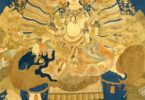《百喻经》
[The] Sūtra [Of A] Hundred Parables
(七)认人为兄喻
(7) Parable [Of] Recognising [A] Person As [One’s] Brother
昔有一人形容端正智慧具足,复多钱财,举世人闻无不称叹。
[In the] past, [there] was a person [with] appearance upright, [and] wisdom complete, also [with] much money [and] wealth, [whom] people throughout the world, [when] hearing [of him, are] without [those] not praising [and] admiring.
时有愚人见其如此,便言我兄。所以尔者,彼有钱财须者则用之,是故为兄;见其还债,言非我兄。
Then, [there] was [a] foolish person, seeing him like this, then saying, ‘[He is] my brother.’ Why [is] that thus? [When] that [person] has money [and] wealth, [when] needing that, then [able to] use it, therefore is [he his] brother. [When] seeing him [to be] returning debts, [then] saying, ‘[He is] not my brother.’
傍人语言:「汝是愚人!云何须财名他为兄?及其债时复言非兄。」
[A] bystander spoke [these] words, ‘You are [a] foolish person! Why [are you when] needing wealth naming him as [your] brother? And [when] he [is returning] debts, again saying [he is] not [your] brother?’
愚人答言:「我以欲得彼之钱财认之为兄,实非是兄,若其债时则称非兄。」
[The] foolish person replied, saying, ‘I, with [the] desire [to] attain [the] money [and] wealth of that [person, then] recognise him as [my] brother, [although] truly, [he] is not [my] brother. If, when he [is returning] debts, then calling [him to] not [be my] brother.’
人闻此语无不笑之。
People [who] heard these words [are] without [those] not laughing [at] him.
犹彼外道,闻佛善语贪窃而用以为己有,乃至傍人教使修行不肯修行,而作是言:「为利养故,取彼佛语化道众生,而无实事,云何修行?」
Like those [of] external paths, [when] hearing [the] Buddha’s good words, greedily stealing [them], then using [them], with [them] as [their] own existing [ones], as much as [until] bystanders tell [them to accordingly] cultivate practice, [yet] not willing [to] cultivate practice, then making this statement, ‘For profit [and] gain thus, [we] obtained those Buddha’s words [to] transform [and] guide sentient beings, yet without [such] true matters, how [can we] cultivate practice?’
犹向愚人为得财故言是我兄,及其债时复言非兄,此亦如是。
[They are] like [the] former foolish person, for attaining wealth thus, saying ‘[He] is my brother’, and when he [is returning] debts, again saying ‘[He is] not [my] brother’, this [is] likewise thus.
[Note: The ‘person with appearance upright and wisdom complete’ is a metaphor for the Buddha, with the ‘much money and wealth’ being metaphors for his immeasurable meritorious virtues (功德). The foolish person represents those of external paths, who wish to ride upon the Buddha’s popular teachings by regurgitating them for worldly benefits, such as gathering followers and offerings, while not spiritually benefitting by practising them personally.
However, when the Buddha is criticised unfairly, instead of correcting to stand up for him, they then dissociate from him and his teachings. This is because they have yet to truly appreciate, accept and actualise the Buddha’s teachings. They are thus neither true to the teachings they are supposed to espouse, nor to the Buddha’s teachings, neither true to their followers, nor to the Buddha’s followers. Most of all, they are not true to themselves.]
Namo Amituofo : Translation and notes by Shen Shi’an
上个喻
Previous Parable:
子死欲停置家中喻
[6] The Parable Of Having A Son Dead, Desiring To Leave And Put Him At Home
https://purelanders.com/2023/07/26/6-the-parable-of-having-a-son-dead-desiring-to-leave-and-put-him-at-home-from-the-sutra-of-a-hundred-parables
下个喻
Next Parable:
山羗偷官库喻
[8] The Parable Of The Qiāng Mountain Person Who Stole From An Official Storehouse
https://purelanders.com/2023/07/28/8-the-parable-of-the-qiang-mountain-person-who-stole-from-an-official-storehouse-from-the-sutra-of-a-hundred-parables
全百喻
All Hundred Parables:
https://purelanders.com/baiyu





